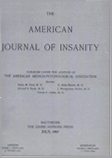ON CERTAIN PROBLEMS PRESENTED BY CASES OF GENERAL PARALYSIS WITH FOCAL SYMPTOMS
Abstract
1. Cases of general paralysis may present focal symptoms which are more or less irrelevant to the general paralysis, e. g., focal symptoms of traumatic origin.
2. Cases of general paralysis may present focal symptoms, which are based on a process which has a common origin with the general paralysis, e. g., symptoms due to softening on the basis of a syphilitic endarteritis.
3. The evolution of a case, which at an early stage presents evidence of syphilitic vascular disease, into a case of general paralysis may be more or less rapid and the clinical picture may represent a combination of more than one process.
4. The exact stage at which the onset of the general paralysis has begun is extremely difficult to determine, even with the help of modern serological methods.
5. The clinical picture alone is sometimes insufficient to enable a positive diagnosis to be made, the autopsy itself may not be decisive, the microscopical examination of the cortex is essential for a decision.
6. The pathological criterion of certain histopathological changes is invaluable, but the relation of these changes to the disease process is quite obscure.
7. Focal symptoms in general paralysis may arise on the basis of localized severity of the paralytic process.
8. In one case reported, of ten years' duration, there was remarkably little mental reduction, but the paralytic process especially involved the right hemisphere.
9. The relation of dementia to the right and left hemispheres respectively is a problem of interest, the study of which may further clinico-anatomical correlation.
10. In many cases of focal symptoms in general paralysis the examination of the brain reveals no adequate cause for the focal symptoms; this should warn one against being satisfied with the crude correlation of the lesions, which we do find in other cases, with the clinical symptoms, seeing that the latter may sometimes be found in the absence of such lesions.
Access content
To read the fulltext, please use one of the options below to sign in or purchase access.- Personal login
- Institutional Login
- Sign in via OpenAthens
- Register for access
-
Please login/register if you wish to pair your device and check access availability.
Not a subscriber?
PsychiatryOnline subscription options offer access to the DSM-5 library, books, journals, CME, and patient resources. This all-in-one virtual library provides psychiatrists and mental health professionals with key resources for diagnosis, treatment, research, and professional development.
Need more help? PsychiatryOnline Customer Service may be reached by emailing [email protected] or by calling 800-368-5777 (in the U.S.) or 703-907-7322 (outside the U.S.).



